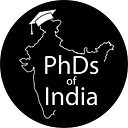Impactful intervention

“I got exposed to computers early on in life because of my father, a school teacher, who would often take me to his school where they had a computer. After being schooled in a village in Rajasthan until Standard IX, I moved to Kota for high school where I opted for science. I wanted to do engineering in computer science, but I didn’t get the branch and had to choose information technology. In my first year of BTech, I realized that it wasn’t something I wanted to pursue as a career. I confided in my parents and told them I would be happier if I pursued BA or BSc. Since I had already completed a year of BTech, which would have gone waste if I had quit, they convinced me to at least finish the degree and then choose something of my liking. Therefore, I studied only to get passing marks so that I could finish BTech without hiccups.
My father always wanted me to pursue something unconventional and build a career out of it. That’s when he introduced me to a university in Chennai for a social sciences course. My mother was skeptical and wanted me to follow a traditional route of becoming a teacher eventually, but she accepted my choice over time. In Chennai, while pursuing my Master’s in Social Work with a specialization in youth and community development, I developed an interest in research. I published several papers in my subject area and participated in numerous conferences, which further solidified my interest in research and ultimately led me to consider a PhD as a viable option.
Initially, adjusting in Chennai, having come from Rajasthan, posed challenges. I am a vegetarian who’s used to eating roti, but rice and non-vegetarian food were more prevalent there. Additionally, I had been schooled in Hindi medium and didn’t speak much English or Tamil. I remember this particular incident where I wanted my roommate to switch off the lights because bugs were coming in and I just couldn’t communicate with him. But I learnt to take these barriers as learning opportunities and embraced the cultural diversity and inclusivity that my university offered. It helped me grow as an individual.
When I appeared for the PhD interview at the University of Delhi, I had no idea about the faculty members there. I still had to fill out my preferences but it turned out either my preferences didn’t have a vacancy or their research area didn’t align with my interests. But luckily, the then Head of the Department did connect me to another professor who was working in the area of my choice and eventually, he became my PhD supervisor.
I went on to work with adolescent boys who had been involved in some form of deviant behavior or were in conflict with the law and were sent to observation homes/correctional facilities. We had such a facility run by the Delhi Government just in front of the university. I did an intervention study focused on the Self-esteem, Risk propensity, and Life skills of these boys. The main challenge was to retain the same set of boys over a period of time, because the moment they got a bail and left the observation home, I had to find a new subject altogether and start from scratch. Getting permission from the government to visit the facility was a Herculean task and the pandemic made it even harder. I had to do multiple follow-ups before I could get a chance to go there and conduct my study.
Also, I feel I had a better research environment, in terms of the papers I published and conferences I attended, during my Master’s than I had in my PhD. I mostly relied on my peers for help whenever needed. Writing my thesis brought in severe anxiety, something I had not experienced before and I could barely sleep for days at a stretch. But it all came together when in my final phase of intervention, two of the boys from the observation home came up and told me that if they had had the intervention before, they wouldn’t have been involved in that deviant behavior. It gave me the validation that I did something impactful for the society which I always wanted to do.

But looking back, I would also like to point out the financial burden that most Humanities students face. Without a JRF, we are paid a mere amount of 8000 INR, while the house rent in Delhi is 10,000 INR. Our education system needs to address this issue and pay the scholars a living amount. Furthermore, there should be an upper limit to finish the PhD. Oftentimes, I have seen scholars with a stable stipend getting lazy and dragging the PhD unnecessarily because they don’t have job opportunities. The uncertainties of employment that come after we are done with a PhD are also a matter of discussion and we must actively talk about it and seek probable solutions.”
-Vishal Mishra, PhD in Social Work, Delhi University
Interviewed by Aniruddha Mukherjee and written by Payel Das
